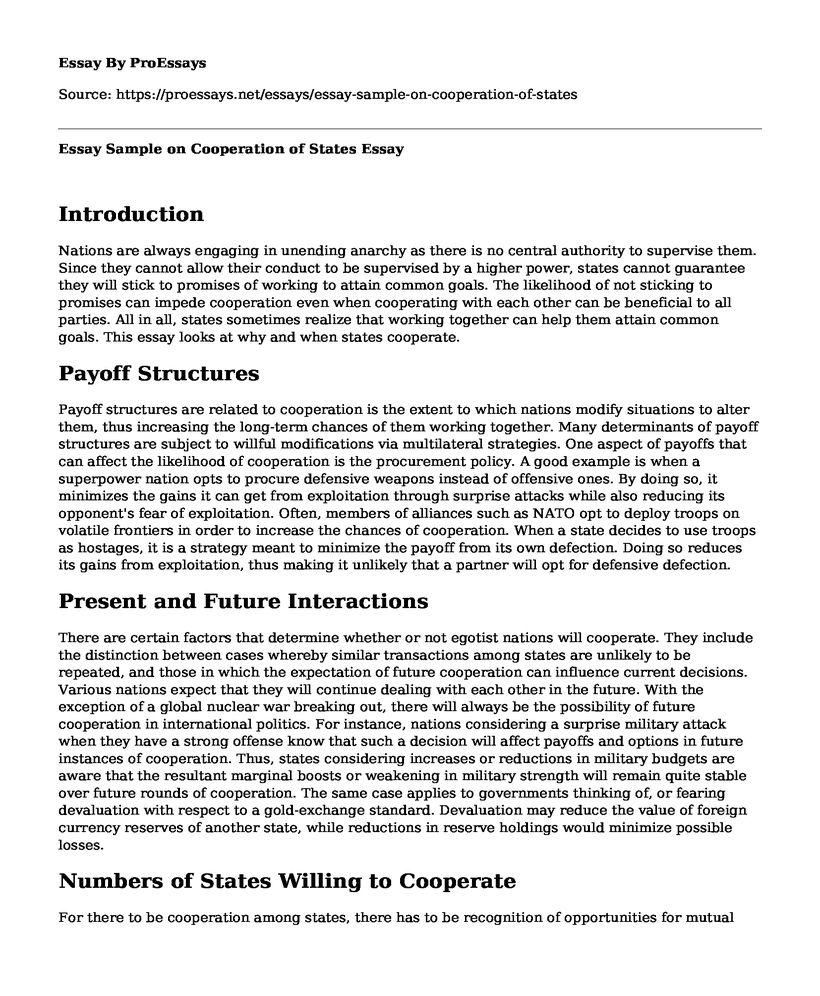Introduction
Nations are always engaging in unending anarchy as there is no central authority to supervise them. Since they cannot allow their conduct to be supervised by a higher power, states cannot guarantee they will stick to promises of working to attain common goals. The likelihood of not sticking to promises can impede cooperation even when cooperating with each other can be beneficial to all parties. All in all, states sometimes realize that working together can help them attain common goals. This essay looks at why and when states cooperate.
Payoff Structures
Payoff structures are related to cooperation is the extent to which nations modify situations to alter them, thus increasing the long-term chances of them working together. Many determinants of payoff structures are subject to willful modifications via multilateral strategies. One aspect of payoffs that can affect the likelihood of cooperation is the procurement policy. A good example is when a superpower nation opts to procure defensive weapons instead of offensive ones. By doing so, it minimizes the gains it can get from exploitation through surprise attacks while also reducing its opponent's fear of exploitation. Often, members of alliances such as NATO opt to deploy troops on volatile frontiers in order to increase the chances of cooperation. When a state decides to use troops as hostages, it is a strategy meant to minimize the payoff from its own defection. Doing so reduces its gains from exploitation, thus making it unlikely that a partner will opt for defensive defection.
Present and Future Interactions
There are certain factors that determine whether or not egotist nations will cooperate. They include the distinction between cases whereby similar transactions among states are unlikely to be repeated, and those in which the expectation of future cooperation can influence current decisions. Various nations expect that they will continue dealing with each other in the future. With the exception of a global nuclear war breaking out, there will always be the possibility of future cooperation in international politics. For instance, nations considering a surprise military attack when they have a strong offense know that such a decision will affect payoffs and options in future instances of cooperation. Thus, states considering increases or reductions in military budgets are aware that the resultant marginal boosts or weakening in military strength will remain quite stable over future rounds of cooperation. The same case applies to governments thinking of, or fearing devaluation with respect to a gold-exchange standard. Devaluation may reduce the value of foreign currency reserves of another state, while reductions in reserve holdings would minimize possible losses.
Numbers of States Willing to Cooperate
For there to be cooperation among states, there has to be recognition of opportunities for mutual interests to be advanced. In addition, there has to be policy coordination as soon as such opportunities have been laid down. As the number of states increase, so does the information and transaction costs. Simply put, the more the number of nations that have to cooperate, the more difficult it becomes to identify and attain common interests. A good example is the Cuban missile crisis. Avoiding a nuclear war called for cooperation between the United States and the Soviet Union, and they pulled it off because there were just two parties. In contrast, it was impossible to avoid the First World War because there were just too many countries involved.
Work Cited
Oye, Kenneth A. "Explaining cooperation under anarchy: Hypotheses and strategies." World politics 38.1 (1985): 1-24.
Cite this page
Essay Sample on Cooperation of States. (2022, Nov 21). Retrieved from https://proessays.net/essays/essay-sample-on-cooperation-of-states
If you are the original author of this essay and no longer wish to have it published on the ProEssays website, please click below to request its removal:
- Research Paper on Development of Social Work in Australia
- Essay Sample on Upper, Lower and Middle Class Peasants Collaborate to Fight Societal Vices in Fascist Era
- Essay Sample on Inequality in America: The Rich vs. Poor Divide
- Govt Business Transactions: Contract Protests & Bidding - Essay Sample
- Reaping Benefits: Community Service for Society's Good - Essay Sample
- Paper on Older Adults: Mental Health Disorders & Anxiety/Depression
- Free Report on INTJ Personality Type: My Jung Test Results







